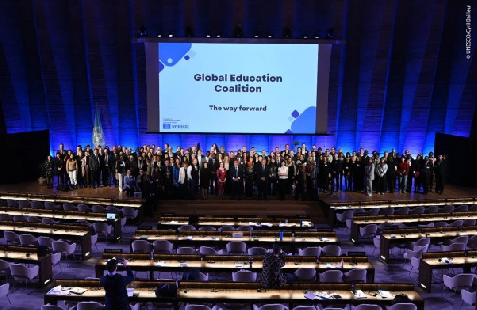
GCED Basic Search Form
Quick Search
Usted está aquí
Noticias

11 April 2023
A new collaborative to accelerate digital transformation in education was launched as UNESCO brought together representatives from more than 70 partner organizations and over 40 Member States for the third annual meeting of the Global Education Coalition.
The event, which took place on 28 March at the UNESCO headquarters in Paris, was the first in-person meeting of the Coalition. On the occasion, the Coalition’s annual report - Transforming education together: the Global Education Coalition in action - was launched, highlighting how Members are supporting countries’ efforts to achieve SDG 4 and the commitments made during the Transforming Education Summit.
Opening the meeting, Stefania Giannini, UNESCO Assistant Director-General for Education, thanked the more than 200 Coalition Members for their contributions to transform education while noting the opportunities promised by new technologies and how these can accelerate the group’s efforts.
“The next five years will be critical to invest in the digital transformation of national education systems … As the Coalition moves forward, steering the digital and green transitions in and through education will increasingly be at the heart of all that it does,” Ms Giannini added.
The future of the Coalition
Throughout the day, Members discussed important questions on the future of the Coalition, including how the group can respond in crisis while also supporting sustainable pathways to scale, and how it can collectively overcome the challenges to creating successful and sustainable multi-stakeholder partnerships.
Firmin Edouard Matoko, Assistant-Director General, Priority Africa and External Relations at UNESCO, stressed the importance of multi-stakeholder partnerships in meeting global goals for education and in addressing ongoing crises – including environmental and economic – that undermine efforts to achieve universal access to quality education.
“The situation demands that we bond together - that we forge bolder partnerships and that we harness the power of collective action to overcome the barriers to learning, to bridge the gaps that exist, and to transform education in ways that will benefit all learners,” said Mr Matoko.
Jane Lawrie, Global Head of Corporate Affairs at KPMG, suggested that Coalition Members should join forces and focus on a shared outcome by identifying and investing in a handful of programmes that have the greatest impact. “I think everyone in this room has a unique skill set [and] by putting their skills towards one outcome, that's where I think we make the biggest difference to young people,” said Ms Lawrie.
Meanwhile, Benjamin Marteau, CEO of Pix, suggested that increased collaboration with education institutions in every country is needed for initiatives to have long term impact. The Coalition, he said, can facilitate the relationships between private sector players and relevant Ministries to make this happen.
The contribution of the private sector in providing access to education was also discussed. Andreas Schleicher, Director for the Directorate of Education and Skills at the OECD, praised the Coalition for encouraging a “culture of public [working] with private in service of the public good.”
“Most of the technological and also social innovation in education has actually come from private sector engagement in the public education system,” said Mr Schleicher. “The Global Education Coalition has really been able to really mobilize that … the question to me really is how can we move from a moment of managing crisis to actually working together to build a future.”
The launch of the Digital Transformation Collaborative
The newly formed Digital Transformation Collaborative, which was officially launched at the event last Tuesday, will play an important role in guiding the work of the Coalition in 2023 and beyond.
Having emerged from the private sector and donor conversations during the Transforming Education Summit last year, the DTC is made up of 30 Coalition partners with on-the-ground digital technology resources and expertise.
Borhene Chakroun, Director for the Division for Policies and Lifelong Learning Systems with UNESCO’s Education Sector, said “The Digital Transformation Collaborative can collectively steer digital transformation education towards equity, inclusion, sustainability, in partnership with member states.” It will do this by focusing on “five keys” - coordination and leadership, cost and sustainability, connectivity and infrastructure, capacities and culture, and content and curriculum.
“We have a theory of change - if we come together and coordinate resources in a smart way, we have the potential to move the needle from small scale pockets of good practises to scale … [and build] ecosystem and sustainable policies, plans and programmes for digital transformation education at a system level and national scale,” Mr Chakroun explained.
Google is one of the founding members of the DTC. William Florance, the company’s Government Relations Program Lead for EMEA, encouraged a more holistic approach to transforming education systems - one which involves working with Ministries of finance, economy and human resource development, as well as education.
Florence also suggested that funding for education should come from a variety of sources - not only national budgets - and that countries need support in making smart investments in scalable technology. “Too often we see heavy investments in technology that maybe is more than what's needed to meet the basic needs of the education system,” he said. But the DTC can support Ministries in investing in the appropriate technologies to facilitate education transformation.
Dina Ghobashy, Senior Manager for Digital Transformation Leadership at Microsoft, another member of the Collaborative, suggested that Member States think of Coalition partners as “innovation labs” that can mobilize research and help design solutions to their country-specific challenges.
“We feel responsible to share what's possible, to amplify the best practises that we're seeing, to help governments leapfrog and even avoid some of the common pitfalls,” said Ms Ghobashy. “It is really important for us to be part of this Collaborative and the Coalition [because] a country's success is our success, and we share the same goals.”
